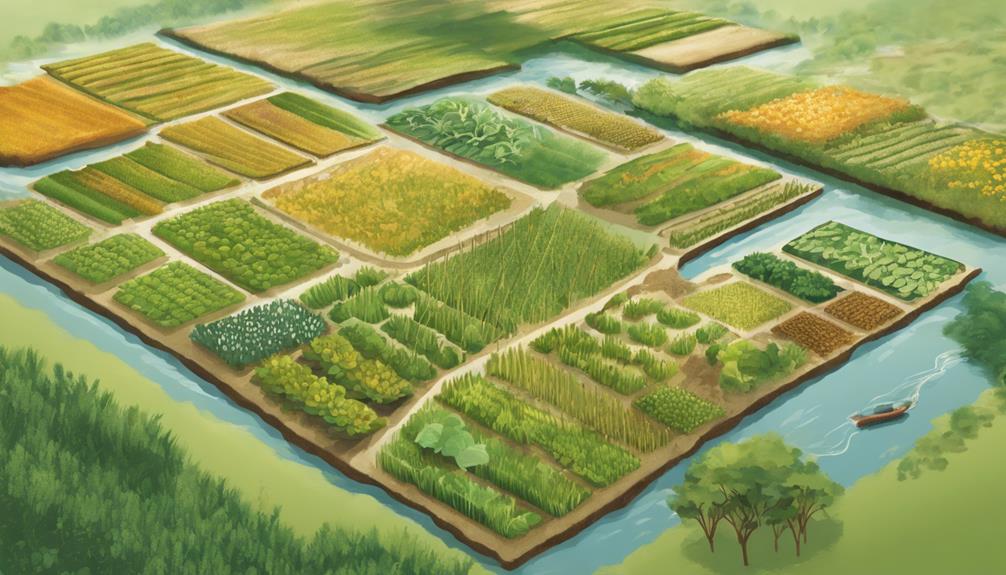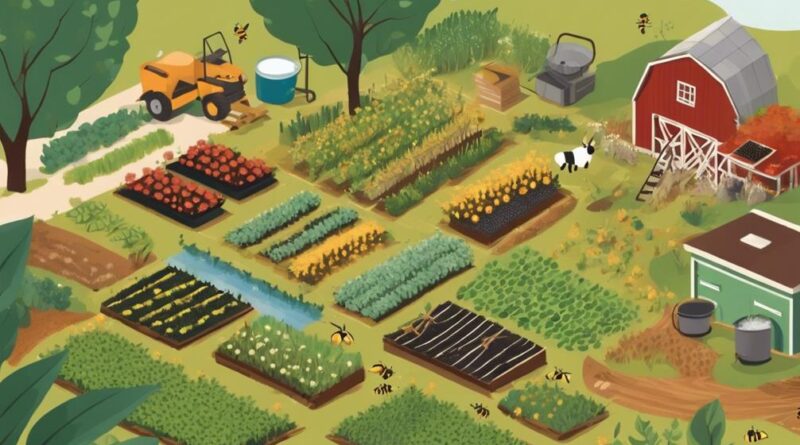Promoting Sustainable Climate Practices Through Natural Agriculture
Embrace organic and regenerative farming to promote sustainable climate practices through natural agriculture. These practices focus on soil health, biodiversity, and reducing environmental impact. By avoiding synthetic pesticides and fertilizers, enhancing soil quality, and implementing crop rotation, you contribute to soil health and nutrient cycling. Regenerative farming techniques like carbon sequestration and reduced tillage aid in storing carbon and mitigating climate change impact. Furthermore, biodiversity and water conservation practices enhance sustainability. By adopting climate-smart agricultural practices and promoting food security, you can further explore the benefits of sustainable agriculture.
The Impact of Organic Farming
Organic farming practices have demonstrated a significant reduction in environmental impact compared to conventional methods. One key aspect contributing to this positive impact is the focus on soil health. Organic farming relies on natural methods to maintain and improve soil health, such as avoiding synthetic pesticides and fertilizers that can degrade soil quality over time. By promoting practices like crop rotation, where different crops are grown in succession on the same land, organic farming helps prevent soil erosion, improves soil structure, and enhances nutrient cycling. These practices contribute to the overall sustainability of the soil, ensuring its long-term productivity.
Crop rotation is a fundamental technique in organic farming that helps break pest and disease cycles, reduces the need for chemical inputs, and improves soil fertility. Research has shown that crop rotation can lead to increased microbial diversity in the soil, which is essential for nutrient cycling and overall soil health. Additionally, rotating crops helps prevent soil nutrient depletion and reduces the buildup of pests and diseases that target specific plant species. Overall, the implementation of crop rotation in organic farming systems not only benefits soil health but also supports sustainable agricultural practices that are beneficial for the environment in the long run.
Benefits of Sustainable Agriculture
Sustainable agriculture practices have been proven to enhance soil quality, increase biodiversity, and mitigate climate change impacts.
One of the key benefits of sustainable agriculture is improved yields. Research has shown that implementing sustainable farming techniques such as crop rotation, cover cropping, and reduced tillage can lead to higher crop productivity over the long term. By maintaining soil health through practices like organic fertilization and agroforestry, farmers can ensure that their land remains fertile and productive for generations to come.
Furthermore, sustainable agriculture plays a crucial role in promoting soil health. Healthy soil is essential for plant growth as it provides necessary nutrients, water retention, and a stable environment for roots. Sustainable farming practices help build and maintain soil organic matter, which improves soil structure and fertility. This not only benefits crop yields but also enhances the overall resilience of the ecosystem.
In addition to improved yields and soil health, sustainable agriculture practices contribute to the conservation of natural resources and the reduction of greenhouse gas emissions. By minimizing the use of synthetic chemicals and promoting biodiversity on farms, sustainable agriculture supports a healthier environment. As a result, farmers can adapt to changing climate conditions and contribute to mitigating the impacts of climate change on a global scale.
Regenerative Farming Practices
Regenerative farming practices have gained recognition for their ability to restore soil health and promote sustainable land management. By focusing on improving soil health, regenerative farming methods such as crop rotation play a crucial role in enhancing agricultural sustainability. Crop rotation involves planting different crops in a specific sequence on the same piece of land. This practice helps break pest cycles, reduce soil erosion, and enhance soil fertility by varying nutrient demands from different crops. As a result, crop rotation contributes to improved soil structure, increased organic matter content, and better water retention capacity, all of which are essential for maintaining soil health.
Research indicates that regenerative farming practices, including crop rotation, can significantly increase soil organic carbon levels. This is important because higher soil organic carbon levels not only improve soil health but also contribute to climate change mitigation by sequestering carbon dioxide from the atmosphere. Additionally, healthier soils with better structure and fertility lead to increased crop yields and reduced reliance on synthetic fertilizers, ultimately promoting a more sustainable agricultural system.
Carbon Sequestration in Soil
Utilizing innovative agricultural practices, such as enhancing carbon sequestration in soil, is crucial for addressing climate change challenges and promoting sustainable land management. Soil plays a vital role in both soil health and carbon storage. By increasing the amount of carbon stored in the soil, we can help mitigate the effects of climate change.
Soil health is directly linked to carbon storage capacity. Healthy soils with high organic matter content have the ability to sequester more carbon. Practices such as reduced tillage, cover cropping, and crop rotation contribute to improved soil structure and microbial activity, enhancing carbon sequestration. Research indicates that increasing soil organic carbon not only benefits soil health but also helps to offset greenhouse gas emissions.
Studies have shown that promoting carbon sequestration in soil can have a significant impact on climate change mitigation. For example, a meta-analysis published in Nature Communications found that sustainable soil management practices could sequester up to 5.5 gigatons of CO2 annually. This highlights the potential of soil carbon sequestration as a viable solution in combating climate change.
Biodiversity in Organic Farms
The presence of diverse plant and animal species in organic farms significantly contributes to ecosystem resilience and productivity. Biodiversity plays a crucial role in maintaining soil health and promoting sustainable agricultural practices. Here are three key ways biodiversity benefits organic farms:
- Enhanced Soil Health: Diverse plant species in organic farms help improve soil structure and nutrient cycling. Different plants have varying root structures, which can break up compacted soil, improve water infiltration, and enhance soil aeration. This diversity also supports a wide range of soil microorganisms that contribute to nutrient availability and overall soil health.
- Natural Pest Control: Biodiversity provides a natural form of pest control in organic farms. By attracting a variety of insects, birds, and beneficial organisms, organic farms can reduce the need for chemical pesticides. For example, planting flowering crops alongside main crops can attract pollinators and predatory insects that help control pest populations naturally.
- Supports Crop Rotation: Biodiversity encourages crop rotation practices in organic farming. Rotating crops helps prevent soil depletion, reduces the buildup of pests and diseases specific to certain crops, and enhances soil fertility. Different plant species have varying nutrient requirements and interactions with the soil, allowing for a more sustainable and productive farming system.
Water Conservation Techniques
Implementing efficient water conservation techniques is essential for enhancing agricultural sustainability and mitigating water scarcity challenges. Two key strategies that can significantly contribute to water conservation in agriculture are drip irrigation and rainwater harvesting.
Drip irrigation, a method that delivers water directly to the roots of plants, reduces water wastage by minimizing evaporation and runoff. Research has shown that drip irrigation systems can reduce water usage by up to 50% compared to traditional irrigation methods. This not only conserves water but also promotes plant growth and nutrient absorption by ensuring water reaches the roots where it's most needed.
Rainwater harvesting is another effective technique for water conservation in agriculture. By collecting and storing rainwater, farmers can reduce their reliance on groundwater sources and surface water bodies. This practice helps to maintain water availability during dry periods and reduces the risk of water shortages. Studies have indicated that rainwater harvesting can provide a significant supplemental water source for agriculture, particularly in regions prone to droughts or limited access to traditional water supplies.
Resilience to Climate Change

To enhance agricultural sustainability and adaptability to changing climatic conditions, exploring innovative practices and technologies is imperative. In the face of climate change, implementing effective climate adaptation strategies and promoting soil health are crucial for building resilience in agriculture.
Here are three key aspects to consider for enhancing resilience to climate change:
- Climate Adaptation Strategies: Adopting climate-smart agricultural practices such as conservation tillage, agroforestry, and water management techniques can help mitigate the impacts of climate change. These strategies aim to enhance productivity while reducing greenhouse gas emissions and promoting sustainability in the long run.
- Soil Health: Maintaining soil health is essential for ensuring crop productivity and resilience to changing weather patterns. Healthy soils with good structure, high organic matter content, and balanced nutrient levels are better equipped to withstand extreme weather events and support diverse soil microorganisms crucial for plant growth.
- Weather Resilience and Crop Diversity: Building weather-resilient farming systems by diversifying crops and planting a variety of resilient crop species can help mitigate risks associated with climate variability. Crop diversity not only enhances resilience to pests and diseases but also provides farmers with a buffer against climate-induced production losses.
Promoting Food Security
Considering global population trends and environmental challenges, ensuring food security remains a critical priority for sustainable agricultural practices. Community gardens play a significant role in promoting food security by enhancing access to fresh produce, fostering community engagement, and creating social impact. These gardens, often established in urban areas, serve as valuable sources of nutritious food for local residents, particularly in food deserts where access to fresh produce is limited. Research indicates that community gardens not only increase food security but also promote social cohesion, improve mental well-being, and enhance community resilience.
Urban agriculture is another vital component in promoting food security and fostering a sustainable local economy. By utilizing vacant lots, rooftops, and other urban spaces for food production, urban agriculture initiatives contribute to increasing food accessibility, reducing food miles, and supporting local farmers. This localized approach to food production not only enhances food security by providing fresh, locally grown produce but also stimulates economic growth by creating job opportunities, supporting small-scale farmers, and boosting the local food industry.
Conclusion
In conclusion, adopting natural agriculture practices such as organic farming, regenerative techniques, and water conservation can significantly contribute to sustainable climate practices.
These methods not only promote carbon sequestration in soil and biodiversity in organic farms but also enhance resilience to climate change and ensure food security.
By implementing these strategies, we can work towards mitigating the impacts of climate change and building a more sustainable future for generations to come.
